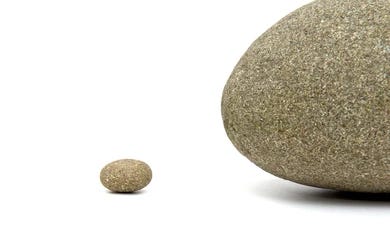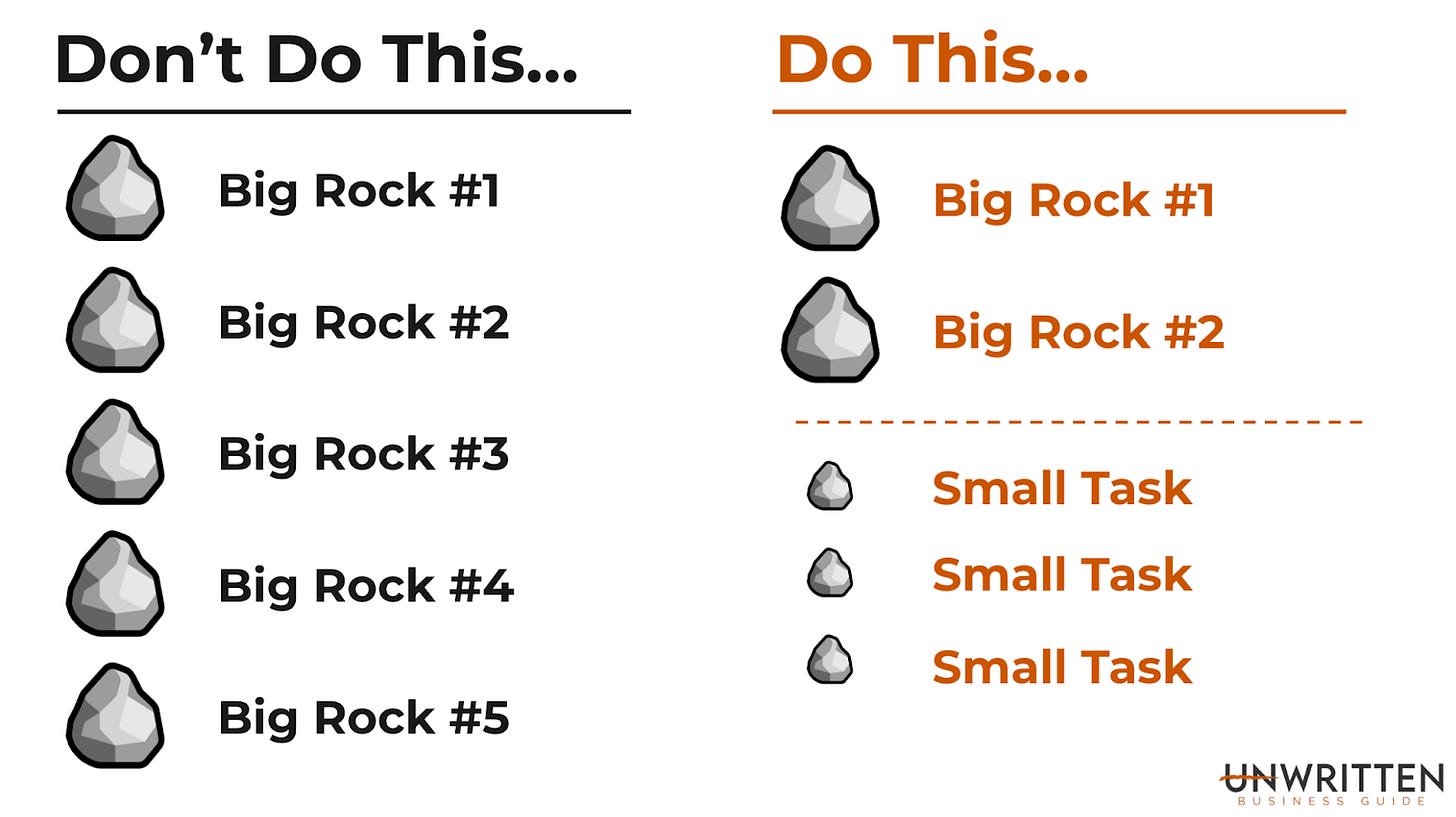Traditional wisdom states that to be successful we should always be working on “needle moving” projects. But that’s not how life is designed…
Big vs. Small Rocks
I first came across the concept of a “Big Rock” when I was attending my MBA program back in 2016. One of my professors was dishing out advice on how to survive the arduous post-graduation years we were all soon to face. One of the few things I remember him saying at the time was that if we were to truly be successful in launching our careers, we needed to quickly identify the needle moving projects (aka “Big Rocks”) and spend all of our effort on these. Moving “Big Rocks” – those massive, high impact tasks – would be the key to winning accolades and shaping our careers.
The advice was sound, and I’ve heard it repeated in dozens of different variants over the years. A world in which we spend our 40-50 hrs/week on only the things that matter is the central concept of some of the best productivity experts out there from Greg McKeown (author of Essentialism) to Cal Newport (author of Deep Work). I whole heartedly agree with the foundational principle.
In the quest for productivity it’s easy to romanticize the idea of spending 100% of our time on Big Rocks. The allure is obvious: it feels significant. It’s satisfying to check off a massive needle moving accomplishment. At year end review these are the accomplishments that get you promoted. No boss in history has ever said “we’re moving you up to Vice President because you did a really great job of answering emails and making sure the office refrigerator was always stocked”.
But if you spend your time obsessing on maximizing your day only with Big Rocks you might find yourself inexplicably stuck.
Why? Because Big Rocks aren’t the whole story. Work (and to a greater extent – life in general) isn’t just a series of headline-worthy accomplishments; it’s also the accumulation of smaller, less glamorous tasks that keep the engine running. AKA, the “Small Rocks”.

Small Rocks are the grease that keep our lives running. No one can escape this reality. We all have things like this. We have to drop packages off at the UPS store, go grocery shopping, take our car to get washed, or stop by the bank. Even high-net worth individuals aren’t immune. Elon Musk still has to brush his teeth. Bill Gates still has to respond to emails. Barack Obama still needs to make his bed and make sure his kids get to school on time. Small Rocks make up much of the fabric of “real life”. And we’ve all seen the perils of ignoring too many of these for too long.
The Hidden Power of Small Rocks
The problem with chasing only the Big Rocks is that they’re often slow-moving. A big project can take weeks, even months, to materialize. If you neglect the smaller rocks – emails, scheduling, tidying up loose ends – they pile up and create friction in your work.
This friction manifests as missed details, delayed responses, and totally preventable chaos. A cluttered inbox or a missed meeting can slow down (and even derail) your most focused effort on the big tasks. I’ve seen many executives who are great at “big strategic thinking” but then lose all impact and momentum because they drop the ball in the seemingly mundane tasks of things like sending a follow up email or scheduling the next meeting. Ironically, it is often the neglect of small and seemingly inconsequential tasks that can end up eroding our capacity to tackle the big ones effectively.
Again – think of Small Rocks as the needed grease in our lives. They provide structure and rhythm to your day, allowing you to maintain momentum between deep dives into your most important projects. While they might not win awards individually, their cumulative effect is what enables the Big Rocks to shine.
Small Rocks also offer an opportunity for micro-wins. A string of small victories — sending an update, organizing your workspace, or knocking out a brief meeting — can give you a boost of motivation and a sense of accomplishment that fuels the next phase of your bigger work. If you are an “achiever” type personality (someone who gets a thrill from knocking things off of your checklist) like I am, this can often be the kind of morale boost you need to keep the daily grind going. I’ll often sprinkle in a minor task in between a big one just to get the small win I need.
Dave Ramey, the famous personal finance guru, famously talks about this same principle when it comes to saving money. It’s called the “Snowball Effect”, which states you should always pay off your smallest debt first, even if that one has a small interest rate as it creates behavioral momentum in paying off debt.
Balancing Rocks
Here’s what it looks like in practice:
My personal advice: Be very selective on how many Big Rocks you’re going to tackle each day. When I plan my day I usually identify what I call my “#1 Most Important Task” (my big rock) and then a series of smaller ones (my Small Rocks). I also usually find it helpful to block off time in my day to tackle my big rock first (what some have called the “swallow the frog” principle), and then with that done, I have permission to take care of all the miscellaneous tasks that need doing.
(Side note: to be honest, I personally find it helpful to “warm up” with 1-2 very small tasks first to build momentum in my work day before challenging myself with the thing that will require my largest amount of mental energy. If you do this too, the risk here is that you can end up procrastinating working your big rock by creating the illusion of productivity because you’ve created a pile of Small Rocks. Don’t fall into this trap. Just remember it’s all about balance)
Conclusion
So, as you plan your workweek, remember this: the magic of productivity doesn’t lie in going all-in on one type of task. It lies in the dance between the big and small, the vision vs. the details. Master that balance, and you’ll find yourself not only getting more done but doing it with less resistance.



